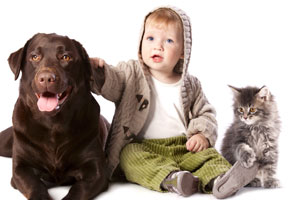
A warm and fuzzy way to reduce allergies
By Linda Bonvie | 0 Comments | Posted 12/28/2014
It’s called the “hygiene hypothesis.”
And it goes like this: Kids who grow up around dogs, cats, siblings – in a more “germy” environment — will not only be much less likely to have allergies to pets, but to foods as well.
It’s a concept, backed by numerous studies, that throws a kibosh on the idea that children need strict “sanitation standards” to grow up healthy.
What researchers are saying is that kids require a certain amount of exposure to microbes and germs to develop a robust immune system. Without this early germ connection, it’s said that instead of developing an “infection fighting” position, the immune system shifts to a more “allergic” one.
Now, my favorite part of this research has to do with how dogs and cats can help.
As a long-time volunteer in a local animal shelter, I’ve seen firsthand the numbers of pets surrendered because of the arrival of a new baby. And that’s a real shame, not only for the poor confused dog or kitty — one who has no idea how in the world they went from a loving home to a small cage in the shelter — but for the baby as well.
Because it’s this early exposure — some studies say before the age of one, others give up to age nine — that appears to provide the best “immunity” against future allergies.
Even better news for all those shelter pets is a study out of Canada and New Zealand several years ago. This research found that to get the best allergy protection, kids need to have both a dog and a cat!
The researchers weren’t exactly sure why having both pets was so beneficial, but said it possibly has to do with the combinations of different allergens and how they can train a developing immune system.
Dr. Thomas Platts-Mills, an allergy expert at the University of Virginia published an earlier study showing how we can even overcome allergies once they take hold.
Kids who might otherwise be allergic, Dr. Patts-Mills said, will not become allergic to a cat living in their home. “It implies that high-dose natural exposure can give rise to a form of tolerance,” he said.
His research was unique as other studies have shown that once a kid becomes allergic, it’s too late to reverse the damage.
But even if your child is already an allergy sufferer, they might still be able to have a canine best friend. Breeds such as the bichon, poodle, Portuguese water dog, Maltese and schnauzer are said to trigger the least allergic responses in those who react to dogs.
But the very idea that pets can help children grow up with a stronger immune system, be healthier and have fewer allergies is good news to puppies, kittens, dogs and cats — and of course, kids everywhere!


 Contact us
Contact us



























